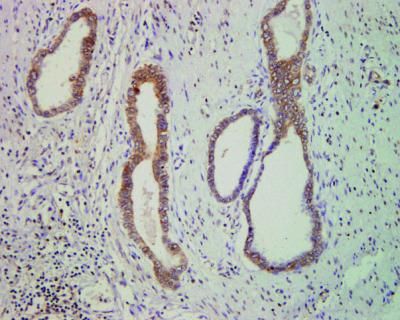Water-shy proteins weaken protection against cancer
Special mutations in important protective proteins lead to the proteins being broken down longer and therefore faster
Advertisement
cancer researchers at the Faculty of Medicine at the University of Freiburg have discovered that certain "non-stop mutations" make important protective proteins against cancer in the body longer, making them "water-shy". The proteins then become more unstable in the aqueous environment of the cell, degrade more quickly and ultimately can no longer act effectively against uncontrolled cell growth. This can increase the risk of tumors. The results of the study could increase precision in the selection of suitable cancer therapies.
"We were able to show that so-called non-stop mutations can play a major role in the development of cancer. Until now, these changes have been overlooked because they do not affect the basic structure of important proteins," says study leader Prof. Dr. Sven Diederichs, who heads the Department of Oncological Research in the Department of Thoracic Surgery at the Freiburg University Medical Center and is a scientist at the Freiburg partner site of the German Consortium for Translational Cancer Research (DKTK). "These findings now offer the possibility of integrating these mutations into cancer treatment decisions," said Diederichs.
Weakened proteins promote tumor growth
Proteins are important building blocks in our cells and are produced as a chain of molecules according to the blueprint in our genome. The end of such a blueprint is normally formed by a stop signal that terminates the sequence of protein building blocks. In the case of a non-stop mutation, this stop signal is lost, so that the protein becomes longer than necessary.
Diederichs' research team has now analyzed 2,335 cases in which these non-stop mutations occurred in various types of cancer in a high-throughput screening. Using a technique called "flow cytometry", they measured how high the concentration of the extra-long proteins was in the cells. It turned out that more than half of these proteins were degraded before they could do their job.
"We were able to show that the proteins whose elongation makes them more water-repellent, one could also say water-shy, are more unstable in the aqueous environment of the cell. As a result, they are quickly disposed of by the cell's cleaning system. This means they can no longer fulfill their function," explains Diederichs.
Tumor suppressor genes and the resulting proteins were particularly affected. These normally prevent the growth of tumors. "These proteins are like the safety brakes in our cells. They ensure that cells only divide when necessary and stop growth if something goes wrong. If these proteins do not function properly, cells can grow uncontrollably and develop into tumors," says Diederichs.
In the next step, the Freiburg researchers want to further investigate the mechanisms behind the mutations that have so far been largely overlooked. "On the one hand, we want to understand in more detail how the individual mutations work. On the other hand, we want to test whether the targeted stabilization of the affected proteins could be a basis for new therapeutic approaches," hopes Diederichs.
Note: This article has been translated using a computer system without human intervention. LUMITOS offers these automatic translations to present a wider range of current news. Since this article has been translated with automatic translation, it is possible that it contains errors in vocabulary, syntax or grammar. The original article in German can be found here.
Original publication
Avantika Ghosh, Marisa Riester, Jagriti Pal, Kadri-Ann Lainde, Carla Tangermann, Angela Wanninger, Ursula K. Dueren, Sonam Dhamija, Sven Diederichs; "Suppressive cancer nonstop extension mutations increase C-terminal hydrophobicity and disrupt evolutionarily conserved amino acid patterns"; Nature Communications, Volume 15, 2024-10-25




























































